Georgia’s motorcycle market shifts into gear
The full-throated roar of a Harley-Davidson Milwaukee-Eight 117 engine, or that of a Yamaha Tenere 700, still turns heads on Chavchavadze Avenue or the Military Highway to Gudauri—as might the sight of one of Kalashnikov’s new electric sports motorbikes. But these days in Georgia, a bike has to be this special to catch the eye.
Motorbikes have lost their rebel status in Georgia, with 150–250 cc models in particular regarded as nothing out of the ordinary. Tbilisi residents have learned to appreciate their traffic-jam-beating flexibility and ease of parking—as well as their low running costs. The large number of bikes on the roads also reflects their role in the country’s fast-expanding international adventure tourism business, with numerous entries on TripAdvisor.
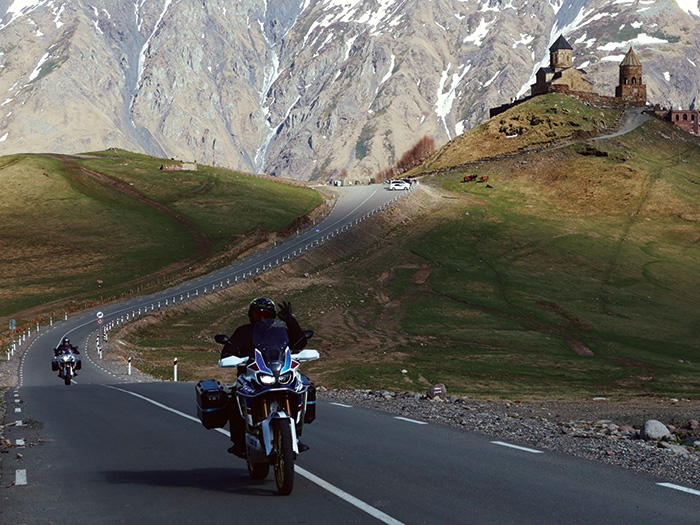
According to the India-based research group 6Wresearch, Georgia’s motorcycle market—including parts, servicing, gear, and international trade—is expected to grow by around 18% this year, reaching about $44 million. This may owe something to the growing interest in the adventures offered on Georgia’s mountain roads, with their hairpin bends and stunning views. Bikers are arriving from as far as the U.S., India, and Scandinavia, with some Scandinavians even traveling overland all the way. Guides and stories of these journeys can be found on adventurebikerider.com and Transeurotrail.org.
Blogs, chats, posts and heavily illustrated travelogues of journeys through the Caucasus are to be discovered aplenty on line, along with tips for other bikers. For example, one Indian biker on an India-to-London run wrote:“I remembered from Rory (the UK motor biker who had crossed Georgia ahead of me) that Georgian authorities scrutinize motorbikes very diligently and ask questions for not having mirrors.”
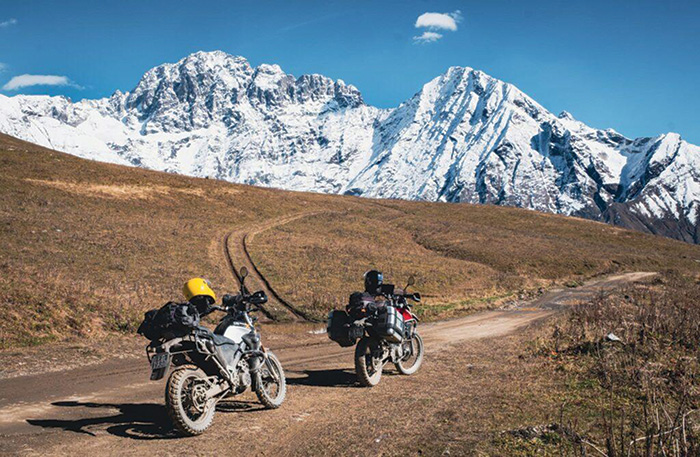
Some descriptions of Tusheti trails are positively ecstatic. A scroll through social media shows Georgia building a cult following among international biker clubs. Their sites offer free routes, maps, and advice on crossing borders and dealing with customs, as well as names of repair shops, hotels, and restaurants.
The Georgian biker scene itself is also growing. “Compared to Western Europe or North America, Georgia is very affordable. The fuel and accommodation are cheap, as is the food and certainly the wine. And there is a long riding season,” explains Swedish biker Dag Karlsson, who rode all the way across Europe. He adds: “It’s definitely been worth the ride.”
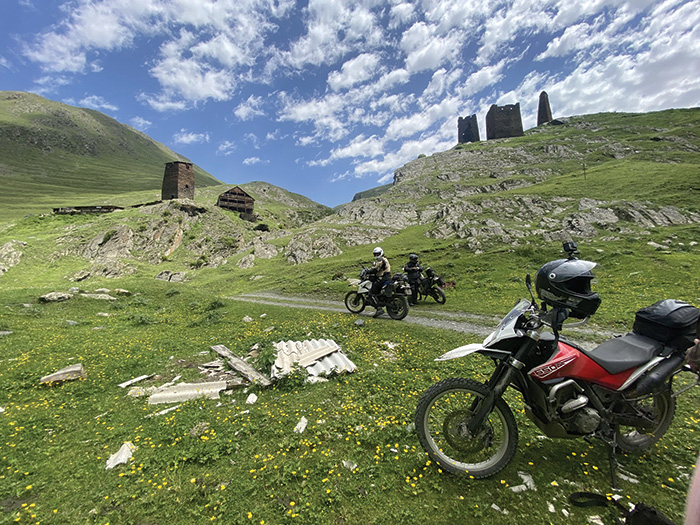
Motorcycle tourism companies
There are four or five leading Georgian bike tourism companies and several smaller ones. These companies provide different levels of adventure, from off-road expeditions to cultural sightseeing, and accommodate various skill levels.
The founders of several are local characters. Among these are Davit Chokheli of Georiders, the first professional mountain biker in Georgian history and an ex-enduro champion, and Paddy Mans of Onward Motorcycle Tours, a familiar figure in Tbilisi’s expat scene.
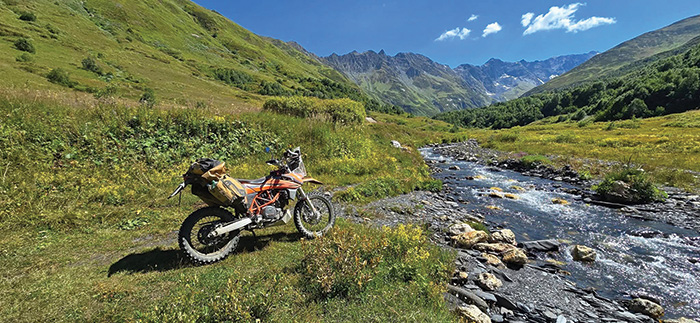
Onward Motorcycle Tours, based in Tbilisi, offers fixed-departure and custom motorcycle tours. Their packages include accommodation, meals, bike rental, and guide services, as well as three-day self-guided tours. They operate in English, Russian, and Spanish, and have been guiding in Georgia for more than five years.
Motorcycle Tours in Georgia (MSA Travel Group) provides guided and fully inclusive tours, as well as rentals. For 2025, options include a 10-day guided tour with Honda and Suzuki adventure bikes, plus a four-day cuisine-and-wine add-on.
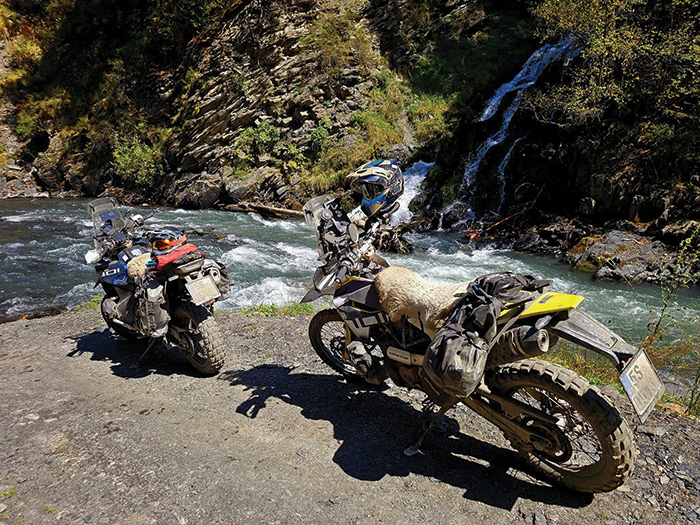
KTM Georgia/SlavaTour LLC runs a 12-day motorcycle tour covering Georgia’s highlights, with beginner-friendly routes mixing off-road and asphalt, and accommodation ranging from guesthouses to hotels. Motorbike options include the Jawa 500 ADV and Royal Enfield Himalayan.
Boraes Adventures has operated in Georgia, Turkey, and Iran since 2013. It offers custom and private guided tours using BMW, Honda, Yamaha, and Suzuki bikes, and can arrange boutique accommodations for clubs or groups.
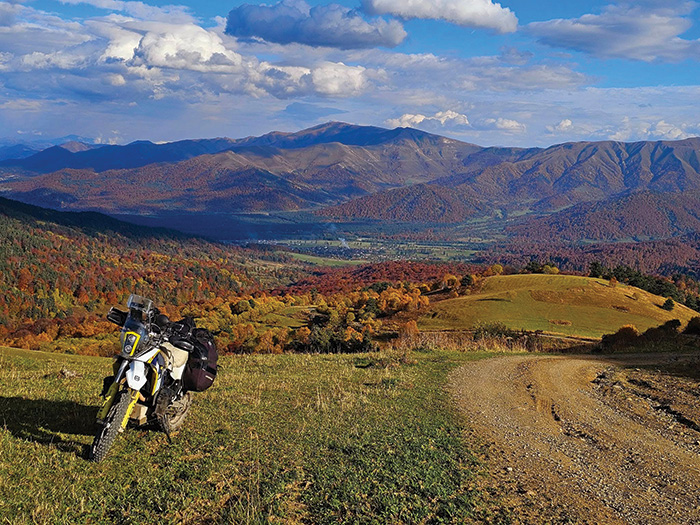
RusMotoTravel features 10-day cross-border tours between Georgia and Armenia, starting and finishing in Tbilisi, with top-spec adventure motorcycles (BMW F750GS/F850GS). Their packages include bikes, guide, support vehicle, petrol, hotels, and excursions.
Georgian bikers
Domestic bikers are also a growing community. Motorcycles Club Georgia, a closed Facebook group, boasts more than 68,000 members. Niche groups are emerging too, such as Cross Riders, a classic motorcycle club based in Tbilisi.
Search engines list seven Georgian motorcycle dealerships, though there are undoubtedly more. These range from Bikeland, Scoot Scoot, and Pitstop Motor to Kawasaki (new Kawasakis and Quadros here). Then there is Motortravel Georgia, described as primarily a rental and tour agency, but also a seller of new and second-hand Hondas and Suzukis.
Online marketplaces such as MyAuto.GE, Mankana, and AUTO.GE list motorcycles for sale, as do Facebook groups like Honda Dio Club Georgia.
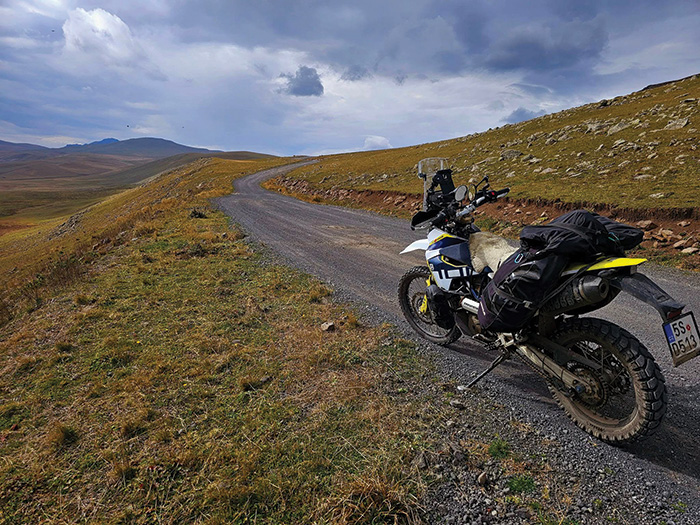
Prices vary widely. Second-hand listings range from $3,300 for a 2000 Yamaha XZF-R1 to $15,933 for a 2022 Indian Scout, and there is every kind of model in between. Adventure, Sport, Cruiser, and Standard types are widely available in most dealerships and specialized stores. Brand new motorcycles can be purchased directly from existing brand dealerships or specialty importers centered in Tbilisi.
Prices for bikes in Georgia may vary from international prices to be seen online due to import taxes, dealer fees, and current stock, but the relative brand positioning—Yamaha as the budget choice, Honda as mid-range with broad offerings, and BMW as the premium brand—remains consistent. For a new bike in Georgia, Yamaha tends to have the lowest average starting prices, particularly for sport and standard bikes, while BMW’s lineup will be the priciest, reflecting its luxury and touring focus.
Insurance is becoming mandatory for motorcycles in Georgia, for visitors as well as locals. The price of insurance is rising this year, with increases of over 10%. Companies include ARDI, GPI Holding, and other local ones, or international insurance firms with Georgian operations.
International motorcycle club websites are telling their members that: “Insurance is available at border crossings, insurance company offices, and online for some providers. ATMs and travel desks in the country may also offer quick policy issuance for travelers. Travelers can purchase temporary motorcycle insurance valid for the duration of their stay.”
Global market
The rise of motorcycles on Georgia’s roads mirrors international trends. According to U.S.-based Cognitive Market Research, the global motorcycle market is projected to reach approximately $84 billion this year, up from $66 billion in 2021. “Unit sales in 2024 reached an all-time record of 62 million motorcycles sold globally, an increase of 2.9% over 2023,” they report. Growth continues in 2025, with Q1 sales marking the best quarter ever at 15 million motorcycles sold, up 3% YoY.
Asia-Pacific dominates, contributing over 62% of global revenue in 2025, with China, Japan, and India the top sales markets. India in particular is sustaining strong growth after a 14.1% surge last year. North America saw modest growth of 0.9%, with declines in the U.S. and Canada offset by Mexico. Heavyweight motorcycles remain especially popular in Asia-Pacific and North America.
Europe, however, faces contraction. “Sales are down more than 16% in 2025 due largely to stricter noise regulations,” warns Cognitive Research.
Unsurprisingly, given the number of Russian bikers on Georgian roads, Russia itself is seeing soaring sales. Statistics agency Autosat reported new motorcycle sales rising 58% last year, to 43,000 units—the highest ever—attributed to affordability. After sanctions pushed out Western and Japanese manufacturers, Indian and Chinese companies filled the gap. While their bikes lack the technology and prestige of European or Japanese brands, they are cheaper. The best-selling brands now include Chinese names Regulmoto (+91.1%) and Motoland (+68%).
Enthusiasm for biking in Georgia seems to abound, but not without caveats. Visitors frequently note that while the scenery and routes are spectacular, local driving habits and congestion can pose challenges. For many, however, the rewards of open mountain roads and cultural discovery outweigh the frustrations of navigating Tbilisi’s traffic!
